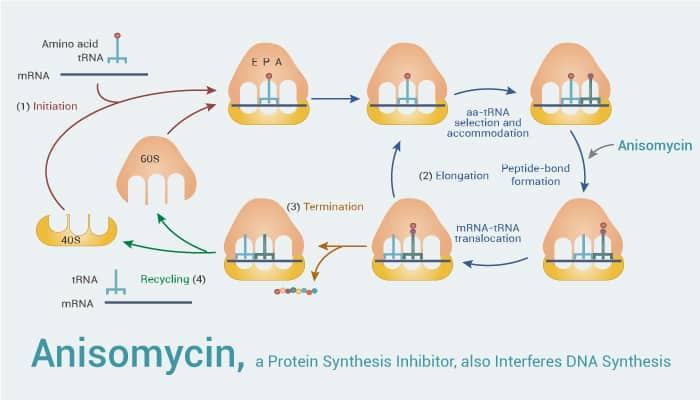Protein synthesis is a core biological process, which balances the loss of cellular proteins by producing new proteins. Specifically, proteins perform many key functions as enzymes, structural proteins, or hormones. Besides, protein synthesis includes two stages – transcription and translation. During transcription, a DNA fragment encoding a protein is transformed into a template molecule called mRNA. During translation, mRNA is read by ribosomes, which use the nucleotide sequence of mRNA to determine the amino acid sequence. In the process of protein synthesis, ribosomes distinguish the chirality of amino acids. Moreover, it prevents the incorporation of D-amino acids into new proteins by slowing down the rate of peptide bond formation.
Furthermore, C-Jun N-terminal kinase (JNK) is a serine/threonine protein kinase. JNK is the core component of the autophagy signaling pathway. Meanwhile, activated JNK plays an important role in the development of atrial fibrillation (AF). Nonetheless, phosphorylated JNK can promote autophagy and cell survival at an early stage. Now, we will introduce a potent protein synthesis inhibitor, Anisomycin.

Anisomycin, a Protein Synthesis Inhibitor, also Interferes DNA Synthesis.
First of all, Anisomycin is a potent protein synthesis inhibitor. Importantly, Anisomycin interferes with protein and DNA synthesis by inhibiting peptidyl transferase or the 80S ribosome system. Particularly, Anisomycin is a JNK activator, which increases phospho-JNK. Obviously, Anisomycin is a bacterial antibiotic.
In the second place, Anisomycin with 60 mg/kg for 4-week by iv significantly decreases mouse body weight in a dose-related manner. Additionally, Anisomycin with 15 mg/kg slightly and transiently decreases the mouse body weight.
All in all, Anisomycin, a potent protein synthesis inhibitor, also interferes DNA synthesis.
References:
Lu Z, et al. Chem Biol Interact. 2017 Nov 1;277:62-73.
Zhengle Tang, et al. Toxicol Lett. 2012 Jan 5;208(1):1-11.